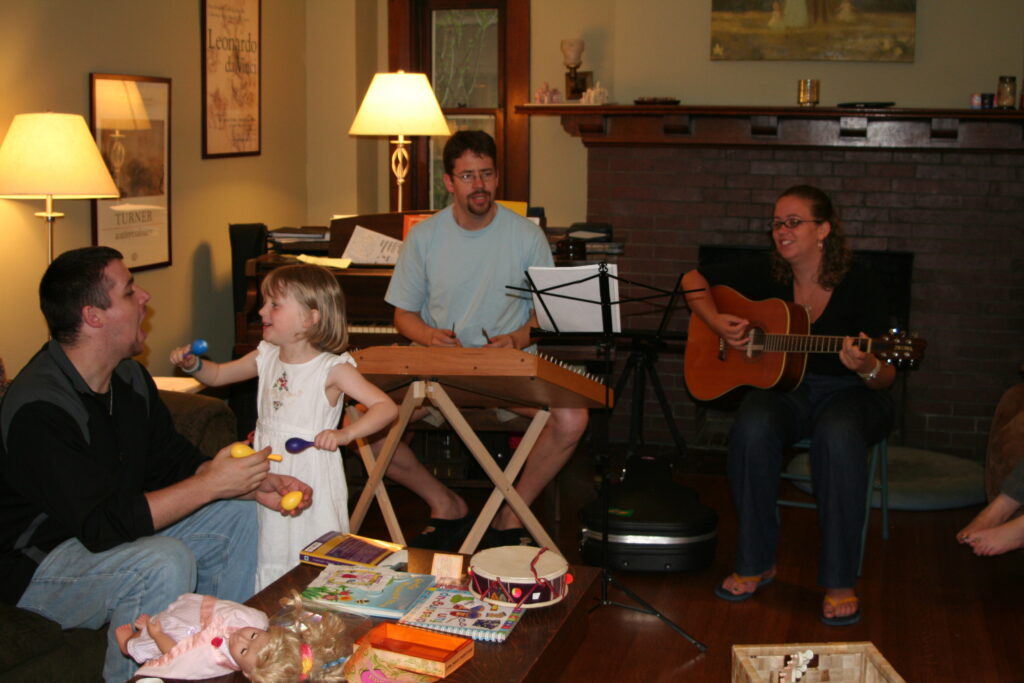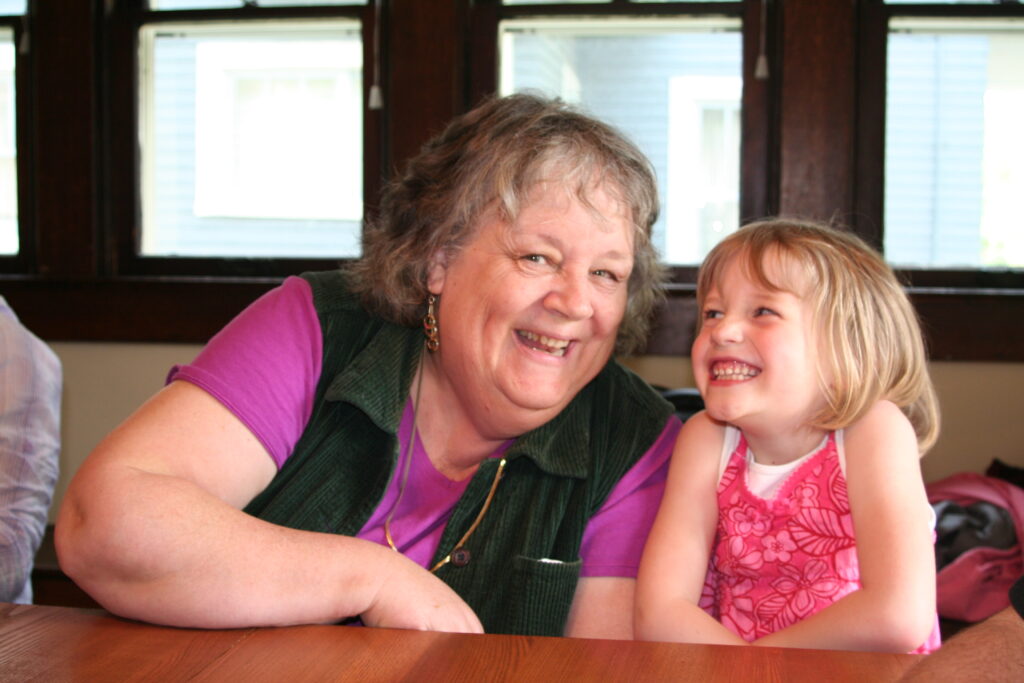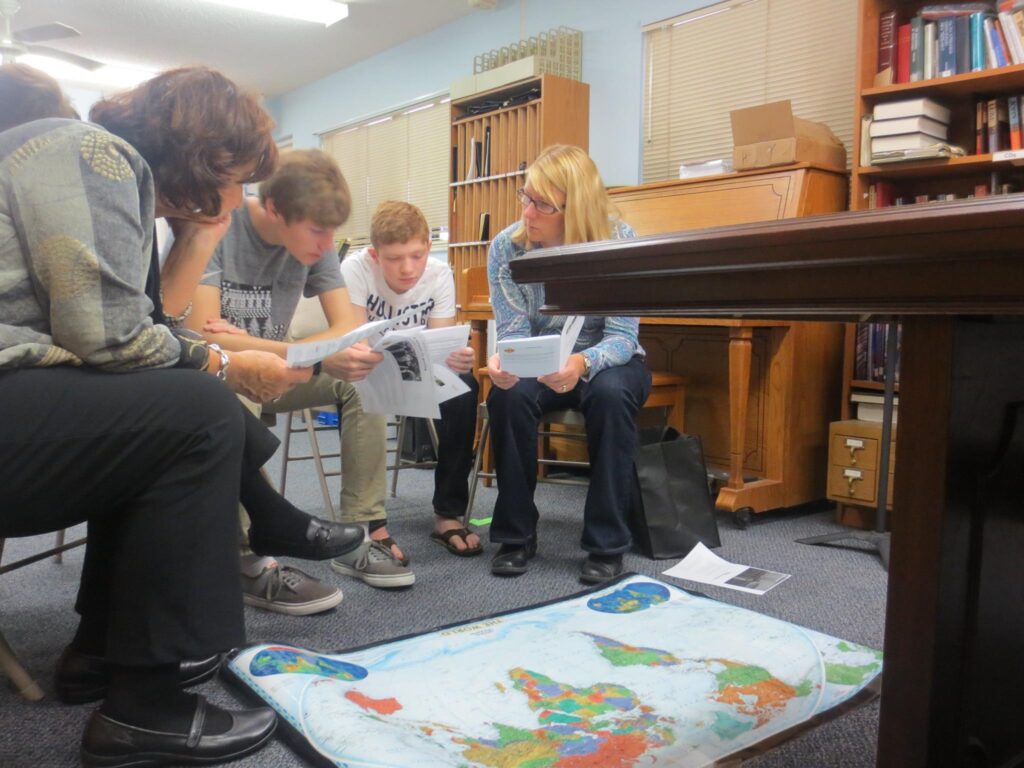As submitted for publication in Canada Lutheran, March 2022.
Sunday School is one of the mechanisms churches use to pass on faith to children and keep them engaged and connected to the church. Developed as a way of supporting and strengthening the overall education and development for children, Sunday school later became primarily about religious education[1]. As families attended worship, participated in Sunday school and other activities, and engaged in a variety of community activities together, children would learn the language, traditions, and practices of faith. The seed of faith was nurtured by a community sharing life together in a whole ecosystem of relationships, experiences, traditions and practices that fostered a lifelong connection and commitment to the church.
The unintended consequence of this shift, along with other factors that were compartmentalizing faith and life, was that the pressure to guarantee ongoing faith commitment was put on pastors, paid staff and a diminishing group of dedicated volunteers.
But as other systems developed to support children, the integration of faith formation into a whole network of relationships and experiences shifted to programs and activities hosted and run by the church. The unintended consequence of this shift, along with other factors that were compartmentalizing faith and life, was that the pressure to guarantee ongoing faith commitment was put on pastors, paid staff and a diminishing group of dedicated volunteers.
In an effort to keep children connected to the church, congregations made technical adjustments to the methods of education and community: moving Sunday School to Zoom, sending home learning materials, pre-recording children’s sermons, and more. As the pandemic extended and what was intended to be short-term solutions became long-term realities, many congregations found that making activities digitally accessible did not automatically result in engagement and participation, and the struggle to find leaders and participants continued. A few discovered that the families that responded to what was offered were not the ones who were actively attending events and programs in-person. The pandemic magnified what many people sensed–what worked for them in terms of nurturing their faith and keeping them connected to the church is not working for younger generations. This is leading to concern, grief, and anxiety as we yearn to support the faith development of children and youth into the future.
What does this mean?
What does this mean for how we nurture and support the faith of children in a pandemic-influenced church? As we look at all that has been dismantled over the last two years, how do we decide which pieces to pick up and in what order to put them back together again? What opportunities for nurturing and supporting faith development in children might be emerging?
These are all adaptive questions–questions which call for innovation, experimentation and creative wondering. Technical adjustments to staff, resources, programs or curriculum alone are not going to affect the trajectory of decline in attendance, engagement, and commitment from children and youth. Outdated tools, patterns, or expectations will not lead to the desired result that children stay connected to church.
What is our Why?
What is motivating our desire to engage and connect with children? Is it about passing on our traditions and rituals? Is it about sharing a communal identity? Is it about making sure that there’s another generation of volunteers and workers to maintain the programs and activities that we’ve invested in? Is it about guaranteeing financial viability for our organizations? None of these reasons are entirely wrong, and it might be all of these things that drive our desire to see children participate in programs and activities and show up in our planning meetings as we consider the future of our church and the legacy of tradition, ritual and cultural identity that has meant so much to us.
Before implementing programs and activities, it’s essential that we clarify within ourselves and within our communities what is motivating our expectations of Sunday school and other children’s ministry programs.
But in our desire to maintain, protect and preserve the structures that have been meaningful to us, are we losing sight of other reasons for supporting faith development with children? Is our desire to see children attending Sunday school and participating in faith community because we want children to know Jesus as we do? Do we want our children to know deep within themselves that the love of God is strong enough to sustain and strengthen them through the valleys and shadows of growing up? Do we want them to be anchored in a community that can guide them as they seek to find meaning and purpose in their lives? Do we want to listen to what God might be saying to us through them? Do we want them to be formed and shaped in a community that boldly defends their belovedness, advocates for their wholeness, and actively seeks to call out their unique gifts and strengths as we participate together in God’s mission?
Before implementing programs and activities, it’s essential that we clarify within ourselves and within our communities what is motivating our expectations of Sunday school and other children’s ministry programs. Nurturing faith with children cannot be only about ensuring the church’s future, and it cannot be out of obligation to tradition or history. Informed by the central narrative of a God who comes into the world in the form of a baby, how might our vision for nurturing faith formation with children be fueled by a desire to encounter God with and through listening to and learning with the youngest in our midst?
Shifting from programs to practices & processes
In his book Reimagining Faith Formation in the 21st Century, John Roberto talks about the adaptive challenges facing the church, and suggests that different programs, different staff, different mechanisms for doing what has been done in the past will not effectively reverse the trend of declining attendance and engagement with young people Instead, Roberto proposes that communities work together to evaluate and renovate the whole ecosystem within which faith is being nurtured, and focus on developing patterns, processes and practicesthat will help to create spaces and places for people of all ages to encounter the God who comes to us in the real person of Jesus[2]. As people of all ages participate in these patterns, processes and practices, they come to know the One who has called them by name and loves them no matter what stage of life they are in and regardless of their circumstances.

These processes are not confined to a particular program and are not the responsibility of paid staff or unpaid volunteers, but are tended and reinforced by the whole community as a way of fostering an environment where people of all ages are being continually shaped and formed by the promises of baptism. Supporting faith development becomes a lifelong commitment for all ages, and is reinforced and encouraged through the broad variety of congregational values, activities and priorities–on campus and in homes, in-person and online[3].
The role of the congregational leaders in this renovated faith-nurturing ecosystem becomes encouraging, supporting, and resourcing a community where these practices are nurtured and explored across all ages. There is still a place for structured learning and curated programs, but these events and activities are strategically placed in a broader context of a multi-dimensional commitment to intergenerational and lifelong faith formation that is shared and supported by the whole community.
This invitation to put Sunday school or other age-specific learning activities in a broader environment of faith and community is an invitation to reclaim the richness in the history and tradition of our church. Before the construct of Sunday school, Luther League, youth programs and activities that centered on church staff or dedicated volunteers, supporting and encouraging the faith professed at baptism was the work of the whole community.
In this vision of a faith-forming ecosystem, the naturally multi-generational aspect of Lutheran congregations becomes a significant asset in imagining how communities support and invest in faith formation. Rather than an emphasis on programs and activities, and measuring success by numbers in attendance in worship, Sunday school and confirmation class, congregations seek to be and develop spaces, places and relationships where the love of God is revealed in ways that are transformational, and where people of all ages and experiences of life find meaning and purpose. The practices of relationship, ritual, celebration, story-telling, spiritual formation and acts of service become avenues for God to stir up in all of us the gift of the Holy Spirit–the spirit of wisdom and understanding, the spirit of counsel and might, the spirit of knowledge and the fear of the Lord, the spirit of joy in God’s presence (EvLW 236).
Finding a way Forward
As we continue to find our way through the realities of a changing world, we have an opportunity to reflect carefully on who we are and who we are being called to be. Some of our structures and containers for understanding and expressing our faith have been dismantled, challenged, or in other ways revealed as lacking. At the same time, emerging from this season of chaos and disruption might be a renewed passion for connection and community that can draw us into broader and more creative expressions of faith and learning.
As we continue to ask questions about what’s motivating our desire to connect with children, hopefully we are drawn deeper into an invitation to nurture our own faith and explore our own relationship with Jesus. Hopefully we are inspired to reconnect with the stories of a God who speaks into chaos and calls forth life, who lifts up those who are burdened and strengthens those who are weak. Hopefully we reconnect with this God who calls us by name and gathers us into transformational community with a vast diversity of humanity as an expression of boundless love and grace. Hopefully we realize again that this God who is made known through the life of Jesus, who calls unlikely disciples to follow him, whose love is made real in the midst of suffering and persecution, and who defeats the power of death with a promise of new life still really matters to us…not just as a Sunday school story but as a daily, incarnational reality that draws us deeper into the world around us.
Conclusion
We don’t need new programs, expensive curriculum, or charismatic staff to nurture and support faith formation with children. We also don’t need to hold on to metrics of success anchored in old models. We DO need to clarify our purpose for wanting to engage children, become comfortable telling our own stories of transformation, take seriously the promises we say together at baptism, regenerate a commitment to tend to our own faith, and continue to respond to the Holy Spirit’s presence in our communities.
As we ask new questions and stay open to new opportunities to enter into the story God is telling through the lives of children and young people, and as we daily return to the waters of our own baptism, we deepen this prayer for ourselves and for others:
Father in heaven, for Jesus’ sake, stir up in us the gift of your Holy Spirit; confirm our faith, guide our life, empower us in our serving, give us patience in suffering, and bring us to everlasting life. Amen. (EvLW 236)
While the container of Sunday school needs to be examined, the invitation to nurture faith formation in children and families is still a powerful way for congregations to participate in God’s mission. In the context of a whole community that claims the promises they make at baptism to “support these siblings and pray for them in their life in Christ,” some particular resources offer tools and ideas:
- Milestones Ministry provides a framework for marking, celebrating and reflecting on God’s presence in the midst of significant moments of transition. Milestones are a way to equip people of all ages to notice and connect with God’s presence in their daily lives.
- Intergenerational Religious Education. Several models and curriculum for intergenerational religious education have been developed recently. Some examples include Faith Inkubators and GenOn Ministries. Christian Education curriculum developers like Sparkhouse and Feasting on the Word include intergenerational or multi-age learning resources as part of their material as a way of inviting communities to integrate learning into all ages.
- Liturgy & liturgical seasons. Congregations that continue to be shaped by liturgy and liturgical seasons have incredible opportunity to invite people of all ages into the embodied rhythms of faith. Teaching and expressing the meaning and richness in liturgical rites, seasons, and celebrations is a way to support faith formation. Sundays and Seasons has helpful resources on visual art, symbols, rituals and activities that can deepen a community’s liturgical practice.
- Adult education and small group ministry. Children and young people will be invited into ongoing faith formation as they are surrounded by and inspired by adults who model an active lifelong commitment to faith and learning. Small group ministry is a great way to engage families in community and learning.
- Outdoor ministry and retreat/camping ministry. The Lutheran church has a rich history of camps and retreat ministry, and many adults who stay connected to the church speak to the role of these experiences in their understanding of faith. Supporting and strengthening connections with and experiences of camps and retreats is important in fostering spaces and places for immersive community and faith development.
- Gospel-Based Discipleship. The Indigenous Ministries of the Anglican Church in Canada offers an accessible resource for people of all ages and backgrounds to engage scripture together.
[1] https://www.thecanadianencyclopedia.ca/en/article/sunday-schools
[2] John Roberto, Reimagining Faith Formation in the 21st Century: Engaging All Ages and Generations, (© 2015: Lifelong Faith Associates)
[3] Joyce Ann Mercer, “Cultivating a Community of Practice” in Trends and Developments in Faith Formation, winter 2013 (https://www.lifelongfaith.com/uploads/5/1/6/4/5164069/lifelong_faith_journal_7.4_winter_2013.pdf)
[4] Christian Smith & Amy Adamczyk Handing Down the Faith: How Parents Pass Their Religion to the Next Generation, (© 2021 Oxford University Press)



You must be logged in to post a comment.